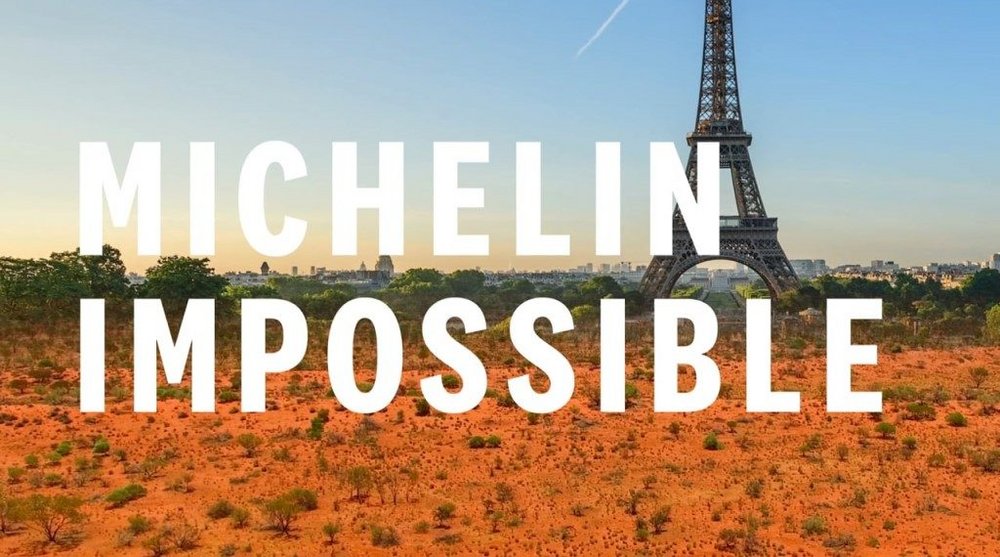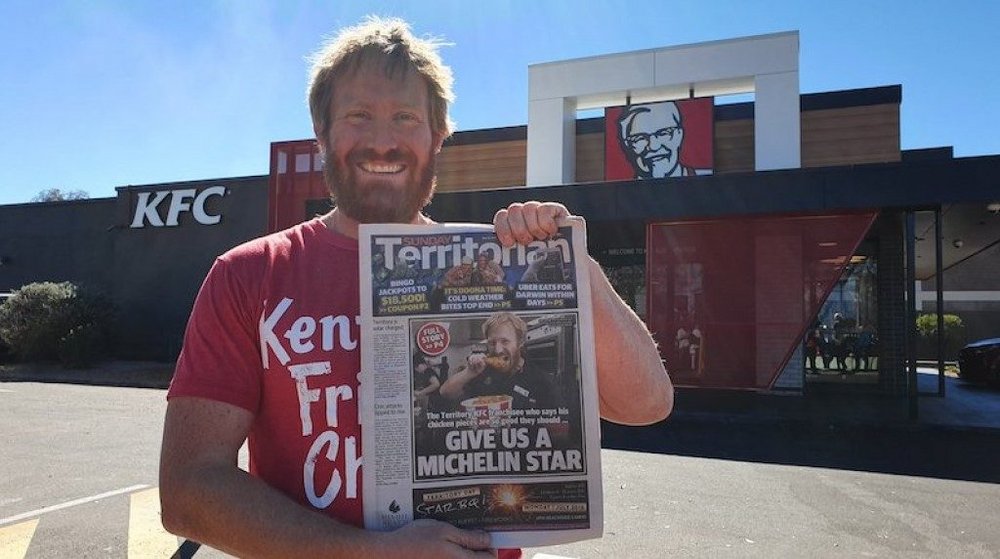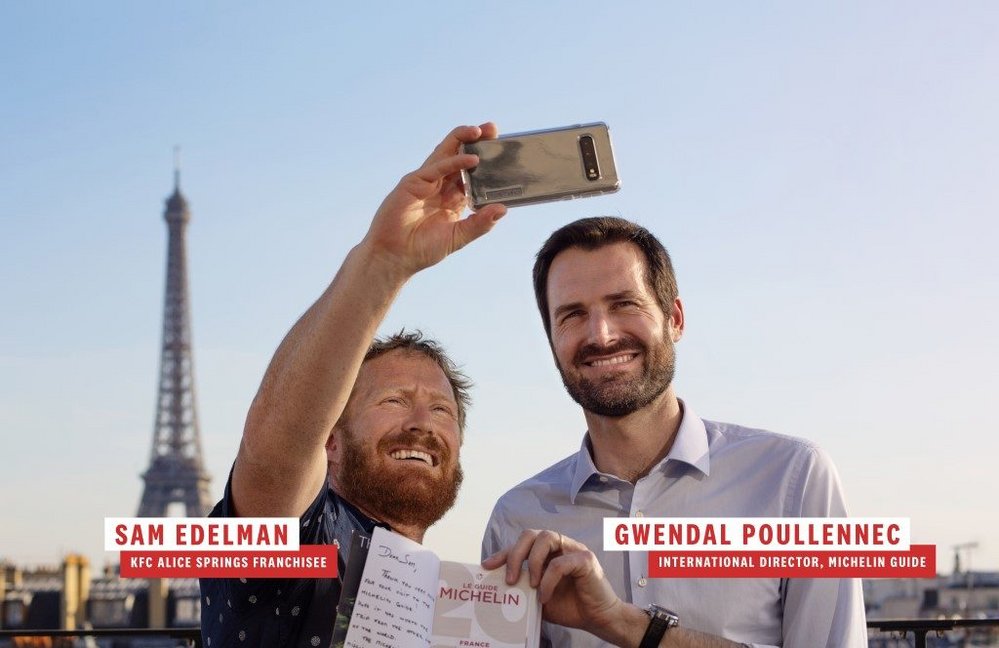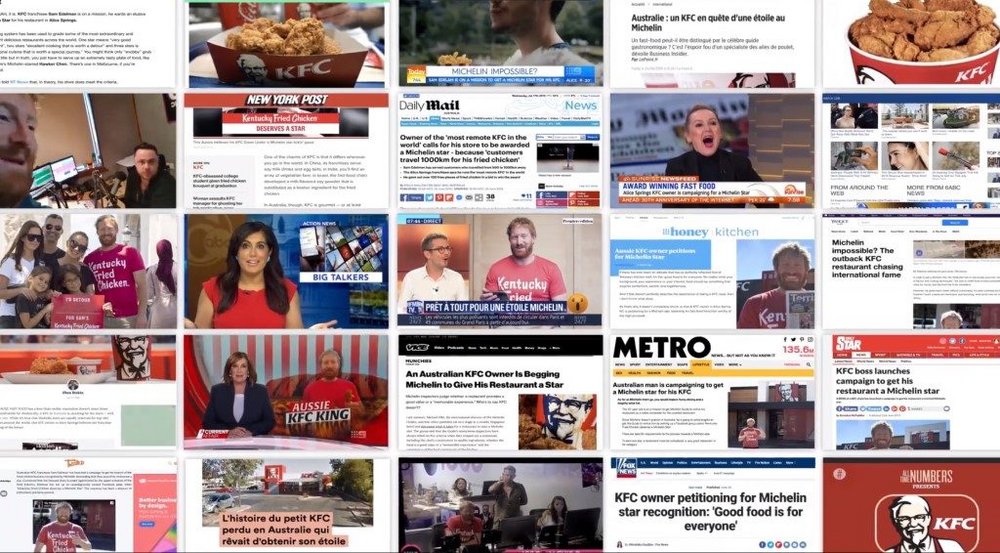Campaign of the Week
KFC finds marketing success in Michelin star failure /
Fast-food chain boosts its image in Australia with Michelin star publicity stunt
Contagious I/O
/
To improve perceptions of its food quality, KFC Australia created a campaign to earn a Michelin star for one of its remote restaurants.
Created by Ogilvy Sydney, the Michelin Impossible campaign set about earning KFC’s most remote Australian outlet the highest award in restaurant dining. The requirements for earning a star include quality cuisines prepared to a high standard, skillfully crafted, and worthy of a detour.
With this in mind, franchisee Sam Edelman was selected as the brand’s spokesperson for the campaign. His Northern Territory Alice Springs KFC restaurant is right in the middle of the Australian outback – 1,600km from the next closest town.

The campaign kicked off with Sam Edelman creating a dedicated Facebook page to his cause, sending the story to several local newspapers and inviting an Australian food critic eat at the restaurant.
KFC then created a series of stunts and activities to court the media. After several media appearances and radio interviews, Edelman was sent to Paris where he interviewed Michelin Star chef Louis Stephane Pitre for advice on achieving the prestigious award, before offering people on the street Kentucky Fried Chicken.

He also drove up to the head office of Michelin carrying a mobile billboard that said ‘Kentucky Fried Chicken deserves a star’ before pleading his case with Gwendal Poullennec, international director of the Michelin Guide.
Despite being rejected by Michelin, the campaign went viral in Australia, being widely covered in the media and reaching international audiences through the likes of Vice, The Guardian and ABC News.

Results / According to the brand, the campaign reached 850 million people via earned media, achieving a 16:1 ROI. Meanwhile, 65% of surveyed Australians said that their perception of KFC’s food quality improved. Additionally, the campaign resulted in more than $60m in incremental revenue over six months, according to its submission paper to the 2020 IPA Effectiveness Awards.
Contagious Insight /
Changing perceptions / The negative slang term ‘dirty bird’ was a mental hurdle blocking Australians from associating KFC with quality. However, by linking the brand with the internationally recognised Michelin guide, KFC successfully challenged negative opinion, notably the 65% of Australians following the campaign saying their quality perceptions of KFC went up. The Michelin Impossible campaign also helped the brand recover its original name of ‘Kentucky Fried Chicken’ in the process, which KFC claims considerably helps its perception. This campaign has lessons that any brand can draw inspiration from, particularly those facing negative or restrictive brand perceptions that it wants to break free from.
Keep the fire burning / A content strategy adopted by many brands and agencies follows the hum, sing and shout model. Hum being always-on content that keeps the brand consistently in the public eye, sing is more campaign-focused content that is distributed at regular intervals, while shout communications are reserved for big marketing stunts and events that put the brand into the culture spotlight and on the front page of the media. Some brands choose to focus on shout while neglecting the hum and sing elements. While shouting can be impressive, it doesn’t have the longevity of spreading the elements over long periods of time, which helps to land the message. In essence, this is what KFC Australia achieved with Michelin Impossible: stoking the fire of the campaign through multiple touchpoints over a number of weeks, and building towards the final crescendo that left a lasting impression on its audience.
The underdogs / The underdog effect has been analysed across numerous studies over the last few decades. For example a 2007 study asked 71 participants to compare two differently ranked hypothetical Olympic swimming teams, the results showed that all participants wanted the underdogs to win. A theory for why this happens is called the basking-in-reflected-glory effect, where people associate themselves with other people’s accomplishments. The greater the odds are against them, the greater the glory you feel. By presenting Sam Edelman as an underdog on a grassroots personal mission (rather than a multinational restaurant conglomerate trying to change attitudes), the media and public became more invested in his cause.
This is a strategy we’ve seen before at Contagious when we covered Bud Light’s bet to purchase the whole city of Philadelphia a beer if they won the Super Bowl. You can read about that campaign in our Insight & Strategy, here. In a similar campaign, Burger King sponsored Stevenage FC, the lowest-ranked team in UK professional football, which you can read about in our Insight & Strategy here.
Want to create better, braver work? Join us in December for Most Contagious 2020, two days of insightful and inspirational talks distilling the year's most vital advertising trends and campaigns. Click here for the line-up and tickets.
Want more of the same? /
We don’t just write about best-in-class campaigns, interviews and trends. Our Members also receive access to briefings, online training, webinars, live events and much more.






